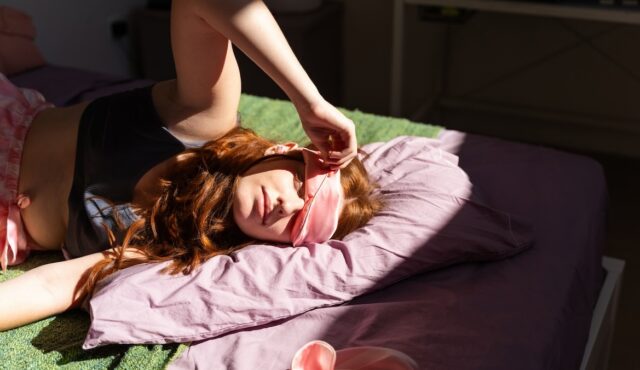From conversations with friends, I realize I’m not alone. Plenty of people I know have trouble falling asleep when exposed to noise or light they’re not used to. Things like traveling, moving into a shared living space, or even bunking with friends who sleep with the lights on can throw off slumber quality.
The good news? You can “train” your body to sleep through it all, or at least reduce its effect on your sleep quality. But it might not be as simple as stuffing ear plugs into your ears or slipping on an eye mask.
Ahead, three sleep psychologists share how to sleep through noise and light—and why some people are more sensitive to these disruptions than others.
Why are some people more sensitive to noise and light when falling asleep?
Even as you’re falling asleep, your brain is hardwired to constantly scan your environment for potential threats, says Sarah Silverman, PsyD, a sleep psychologist and holistic sleep specialist in Orlando, Florida. Your brain’s goal is to make sure you feel safe in your sleep environment.
“Any noise or light that you’re unfamiliar with is going to cue your body to wake up from sleep,” especially during the light sleep phase, says Christina Garcia, PhD, DBSM, assistant clinical professor of psychiatry at the University of Arizona and owner of the Center for Sleep and Psychological Wellness. Noise that’s unpredictable is often what triggers the “alerting” part of your brain—such as loud laughter or shouting, a barking dog, or a roommate rummaging around after getting back from a night out.
In most cases, noise or light isn’t a threat to your safety, but your brain still treats it as such, demanding you make a decision on what to do about it, says Brad Wolgast, PhD, CBSM, a licensed psychologist board-certified in behavior medicine in Media, Pennsylvania.
While this biological process is true for us all, there are some people whose brains seem hyper-aware of external stimuli. According to Dr. Silverman, there’s a potential evolutionary reason for this: Thousands of years ago, “there needed to be a variation in light sleepers vs. heavy sleepers among our ancestors, because there needed to be individuals who could wake up from sleep very easily at night, in order to protect the tribe and keep everybody safe.”
Fast-forward to modern times, and things like anxiety and stress are what typically contribute to that hyper-awareness or vigilance, per the Cleveland Clinic. “On average, [people with anxiety] are more likely to scan their environment for any danger, and that applies when they’re trying to fall asleep, too,” says Dr. Garcia. He says they may also wake up from sleep more easily. And people with chronic insomnia are also more easily disrupted by noise and light, per a January 2009 study in Sleep Medicine Clinics.
How to sleep through noise and light disruptions
All that said, is it possible to get better at sleeping in bright environments and around noise if you’re a light sleeper? According to all three specialists, it is. Here’s their advice on how to do so:
1. Treat both like a non-issue
If you’re keyed up before bed, any extra noise and light can feel overwhelming. But treating both like a “non-issue” (i.e., no big deal) can signal to your brain that you’re safe. “Maybe the tiny noise that wouldn’t have bothered you is now built up because of your emotional reaction,” says Dr. Garcia. “If you’re stressed about it, or angry, sleep is probably not going to show up.”
Here’s what to do: First, notice your emotional response without any judgment. Then, try a calming technique that works for you, like deep breathing, clenching and releasing your fists, or getting out of bed and “shaking it out” or moving around, per Dr. Garcia.
After that, Dr. Wolgast recommends saying a few reminders to yourself, to change how you think about the noise and light. Some examples include: “It’s fine.” “It’s not an issue.” “I’m okay.” “I’m safe.”
2. Let go of the belief that you need a perfect environment to sleep
Maybe you, like me, believe a room needs to be completely dark and quiet for you to fall asleep. But according to sleep psychologists, this mindset can ironically make it harder for you to sleep when conditions aren’t “perfect.”
“Having a rigid set of rules around sleep, that you need a perfect sleep environment that is dark and quiet, that you have to follow all of the sleep hygiene rules, oftentimes creates this to-do list before bed, and your brain thinks you have to do all these things to achieve perfect sleep,” says Dr. Silverman. Sometimes, that backfires for people.
Dr. Wolgast suggests taking some of the pressure off. Remind yourself that “sleep is a drive, just like thirst and hunger. You go without it long enough, your body is going to demand it, and eventually sleep will come,” he adds.
3. Remind yourself a bad night of sleep is normal
A bad night of sleep here and there is inevitable, especially if you’re a new parent or have a health condition that disrupts sleep. Trying to achieve “perfect sleep” every night can lead to something Dr. Garcia calls “sleep effort.” This essentially means the harder you try to sleep, the harder it becomes.
Thankfully, “if you’re sleeping well on four or five nights out of seven, having a couple nights sprinkled in here and there that aren’t great, or that maybe do get disrupted by noise or light, is actually a normal or realistic expectation to have around sleep,” says Dr. Silverman. While you may not feel your absolute best the next day, you’ll make it through.
Plus, if you’re really tired the next day, you can try to squeeze in a 30-minute nap to tide you over.
4. Turn on a fan or sound machine
A loud fan or sound machine can drown out particularly noisy nights, per Dr. Silverman. You can choose a sounds that works for you, like white, pink, brown, or green noise. These sounds are more predictable and unchanging, meaning your brain doesn’t perceive them as a threat.
Turning your sound machines to a slightly higher volume than whatever’s noisy outside can help distract your brain, making it easier to stay asleep through noise.
5. Use ear plugs or an eye mask (or both!)
Wearing ear plugs and/or an eye mask for sleeping in bright or noisy environments can be great quick fixes. But Dr. Wolgast suggests only using them when you really to—like when traveling to a noisy city or place with a different time zone than what you’re used to. He also advises trying tools (like masks) one at a time. For example, start with a sound machine, and if that still doesn’t drown out noise, pop in the ear plugs, too.
The reason for using them sparingly? You want to avoid your brain relying on them in order to fall asleep, in case you’re in a situation where neither are available to you.
6. Reach out to a sleep psychologist
If you’ve tried everything above and you’re still not sleeping well on a regular basis, it might be worth reaching out to a professional. A sleep medicine specialist or sleep psychologist can offer tips for getting better quality sleep—which may involve reducing anxiety and stress that creeps up around bedtime.
The bottom line
While ear plugs, eye masks, and sound machines are certainly helpful in mitigating noise and light while trying to fall asleep, you can learn how to sleep through noise and light even if these tools aren’t available to you.
The key is to remember that your bedroom doesn’t need to be completely silent or dark, and even if you do have a bad night of sleep, you will be okay and able to function the next day.










